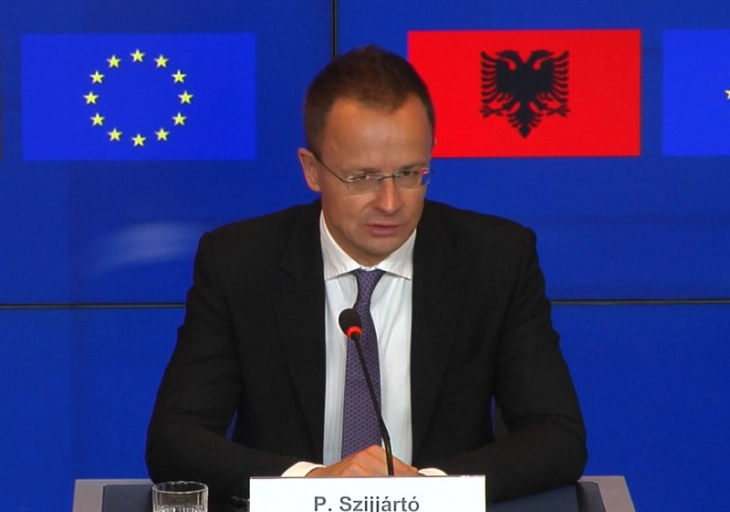Szijjártó: Only those not enthusiastic about enlargement claim consensus is the problem
- It would be ideal if North Macedonia and Bosnia and Herzegovina also held intergovernmental conferences to start their EU negotiations by year-end, Hungarian Minister of Foreign Affairs and Trade Péter Szijjártó told a press conference in Luxembourg after holding the Second EU-Albania Intergovernmental Conference that formally kicked off the country's accession negotiations by clusters, MIA's Brussels correspondent reports.

Brussels, 15 October 2024 (MIA) — It would be ideal if North Macedonia and Bosnia and Herzegovina also held intergovernmental conferences to start their EU negotiations by year-end, Hungarian Minister of Foreign Affairs and Trade Péter Szijjártó told a press conference in Luxembourg after holding the Second EU-Albania Intergovernmental Conference that formally kicked off the country's accession negotiations by clusters, MIA's Brussels correspondent reports.
"But this is not only up to us, the EU Presidency. It is not up to the Commissioner either. It depends on the consensus between all 27 member states," Szijjártó said at the joint press conference held with Albanian Prime Minister Edi Rama and the European Commissioner for Neighborhood and Enlargement Olivér Várhelyi earlier on Tuesday.
In response to a reporter's question whether it would be better to abandon the consensus principle in enlargement decision-making altogether, Szijjártó said member states who claimed that consensus was an obstacle to enlargement were merely looking for excuses because they were not enthusiastic about the process.
"Believe me, if I had to name an area in which hypocrisy is rife in the EU, then it is enlargement," he said. "I have heard my colleagues saying one thing in public and another thing to us. I am sad to say that not everyone says the same things in public and behind closed doors," Szijjártó said.
According to him, abandoning the consensus principle in decision-making would lead to the break up of the European Union.
He said without consensus, smaller or medium-sized member states would be pushed aside. "If there were no need of consensus, then the big states would be deciding on important issues, and the smaller or medium-sized countries would only have to say 'yes'," he said. He pointed out that this was the reason the EU was based on agreements and methodologies requiring consensus on important issues.
The Hungarian FM said one of the priorities of the Hungarian EU Presidency was enlargement and the start of negotiations with Albania was a step in that direction.
Expressing hope that by the end of 2024 Albania would open the second cluster, he said he was looking forward to progress also in the negotiation process with Serbia.
"If you travel to Belgrade twice in a month, you will see what development and growth mean. So the bureaucrats here who are worried if Serbia is ready to open the [next] chapter, I would suggest they travel to Belgrade and see that they are ready," Szijjártó said, adding that member states "more critical" of Serbia would hopefully not place any obstacles in the country's accession talks.
He added that he expected Montenegro as well to make progress in the negotiations by closing several chapters.
EU Commissioner Várhelyi said the enlargement and the EU's internal reform process should take place in parallel.
"The current institutional setup and the setup of the EU's agreements can perfectly accept new members," he said.
PM Rama expressed hope that Albania would complete the negotiations by the end of this decade and become an EU member state.
"Of course, this is very ambitious," Rama said, adding that the country had a plan, a roadmap, and the support of EU partners. He pointed out that the country's goal was not for Albania to go to Brussels, but to bring the EU's standards into the country. mr/







